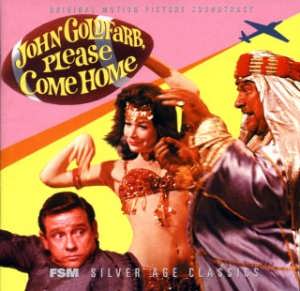John(ny) WILLIAMS
John Goldfarb, Please Come Home
OST orchestrated by Arthur Morton * lyrics by Don Wolf * Notre Dame Victory March composed by Rev. Michael Shea * album produced by Lukas Kendall
FILM SCORE MONTHLY Vol. 4 No. 17 [71:34 - score 54:03 - bonus tracks 17:31]

Available from Film Score Monthly, 8503 Washington Boulevard, Culver City, CA90232; Tel: 1-888-345-6335; overseas: 310-253-9595; fax: 310-253-9588;
John Goldfarb, Please Come Home! is, from the wacky title onwards a very '60's comedy, transferring a fictionalised version of the Gary Powers U2 spy plane incident to a fabricated middle eastern country and making (American) football and Shirley Maclaine central to proceedings. A badly reviewed commercial disaster on release, and barely seen for the last 35 years even on afternoon television, there's only one reason for the appearance of the soundtrack album now. John Williams. Or as he was billed back then, Johnny Williams.
During the '60's Williams scored several light comedies of varying quality, John Goldfarb (1965) pre-dating better, more famous movies such as How Too Steal A Million (1966) and A Guide For the Married Man (1967). This current CD's claim to fame is it represents the earliest Williams score available on CD. However, because the music dates from so far back in Williams career there is little here to connect it with the Williams music fans have grown to love. This really is typical zany comedy music of its period, imbued with the same light jazzy spirit as motivated many a Henry - The Pink Panther - Mancini score of the time.
Most of this writing is "Mickey Mouse" pastiche music, many short cues edited together into longer tracks mimicking the rapidly changing on-screen action. Nothing last for long, often for no more than a few bars, as moods change from big band jazz and swing to cod-Orientalisms, belly-dances, gypsy dances, football anthems, mock "silent movie" music and military marches. The title music is a catchy but deeply irritating "cute" pop-type song, and from here on in virtually anything goes. Being John Williams it is all crafted with great skill, but other than the rare lyricism of the love theme which is featured best in "Sleeping With Asps", bears no relation to the John Williams who began to emerge around the time of The Reivers (1969).
This is a Film Score Monthly release, so comes impeccably presented with a full colour booklet and detailed notes on the cues, score and making of the film, and offers 17 minutes worth of bonus cues. These are mainly mono cues, but also include more alternate versions of the main title song than any sane person could ever wish to hear.
An astonishingly diverse tapestry of musical elements, like extracts from several scores for entirely different types of films all put in a blender and scattered onto a silver disc, this is a kaleidoscopic display of aural colour. Making little sense divorced from its parent movie, John Goldfarb, Please Come Home! can only really be recommended to those who have to have everything by John Williams simply because it is by John Williams. For 1964 the recorded sound is superb.
Gary S. Dalkin

Return to Index